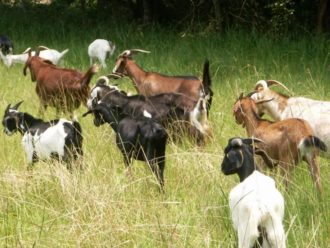The Southern Sustainable Research and Education Program has announced its 2020 Large Systems Grant award.
The project will create a group of 1890 Universities and farmer cooperators to conduct large systems research on sustainable meat goat production and marketing.
Large systems research is designed to increase our understanding of the complex relationships between parts in a system. This is different than component research projects which analyzes parts of the system in isolation. By studying the system as a whole, the researchers hope to provide balanced, long-term solutions.
The Southern SARE program has funded the Large Systems Research Grant for $200,000 per year for three years with the opportunity for additional three-year renewals, for a maximum of nine years.
With the goal to enhance sustainability and increase business opportunities within the goat industry in the southeastern United States, this grant project was intended specifically for research teams who have established multi-state, multi-disciplinary regional projects.
Researchers from Florida A&M, Fort Valley State, Langston, Prairie View A&M, Tennessee State, Tuskegee, and Virginia State universities are all involved in the project. Each of the 1890 Land-Grant universities will involve at least two farmer co-operators in their research.
Currently, the demand for goat meat in the U.S. outpaces domestic supply. At the same time, large-scale production and marketing efforts for goat meat inside the United States are hampered by limiting factors like land availability, access to proper forages and nutrition, health and disease factors, marketing challenges, and lack of processing facilities.
With the support of Southern SARE, researchers will seek to develop a deeper understanding of the factors that impact sustainable goat production in the southeast and increase the sustainability of the Southeastern goat industry.
Langston University researcher Terry Gipson is the principal investigator. Co-investigators for the grant are Nirodha De Silva and Roger Merkel from Langston University, Kesha Henry from Prairie View A&M University, Uma Karki of Tuskegee University, Brou Kouakou of Fort Valley State University, Angela McKenzie-Jakes of Florida A&M University, Dahlia O'Brien of Virginia State University, and Richard Browning Jr. of Tennessee State University.
Southern SARE does not issue Large Systems Grants every year. These funds are used exclusively to answer larger, long-term questions rather than find short-term solutions to problems. In the past, Large Systems Grants were awarded to projects that integrated crop and livestock agroecosystems research in the Texas Panhandle, developed local and regional food systems, and analyzed long-term soil health strategies like cover crops in North Carolina.
For more information on the Southern SARE program and this grant, please visit southern.sare.org
Published by the Southern Region of the Sustainable Agriculture Research and Education (SARE) program. Funded by the USDA National Institute of Food and Agriculture (NIFA), Southern SARE operates under cooperative agreements with the University of Georgia, Fort Valley State University, and the Kerr Center for Sustainable Agriculture to offer competitive grants to advance sustainable agriculture in America’s Southern region. This material is based upon work that is supported by the National Institute of Food and Agriculture, U.S. Department of Agriculture, through Southern Sustainable Agriculture Research and Education. USDA is an equal opportunity employer and service provider. Any opinions, findings, conclusions, or recommendations expressed in this publication are those of the author(s) and do not necessarily reflect the view of the U.S. Department of Agriculture.
